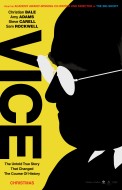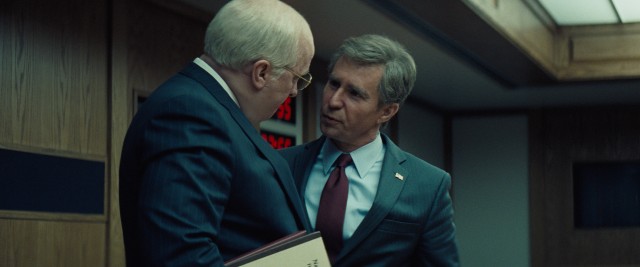Vice Movie Review
 |
Vice
Theatrical Release: December 25, 2018 / Running Time: 132 Minutes / Rating: R Writer/Director: Adam McKay Cast: Christian Bale (Dick Cheney), Amy Adams (Lynne Cheney), Steve Carell (Donald Rumsfeld), Sam Rockwell (George W. Bush), Tyler Perry (Colin Powell), Alison Pill (Mary Cheney), Lily Rabe (Liz Cheney), Eddie Marsan (Paul Wollowitz), Justin Kirk (Scooter Libby), LisaGay Hamilton (Condoleeza Rice), Jesse Plemons (Kurt), Bill Camp (Gerald Ford), Don McManus (David Addington), Shea Whigham (Wayne Vincent), Stephen Adly Guirgis (George Tenet), Fay Masterson (Edna Vincent), John Hillner (George Bush Sr.), Kirk Bovill (Henry Kissinger), Kyle More (Roger Ailes), Matthew Jacobs (Antonin Scalia), Paul Yoo (John Yoo), Terri Cavanaugh (Focus Group Leader), Naomi Watts (Fox News Anchor - uncredited), Alfred Molina (Waiter - Uncredited) |
It only took one movie for Hollywood to start taking Adam McKay seriously as a filmmaker. McKay had been writing comedy for nearly twenty years, first at "Saturday Night Live" and then as the chief creative partner and go-to director of Will Ferrell. The two collaborated on some of the funniest movies of the 2000s including Anchorman and Step Brothers, both of which McKay directed. McKay does not appear to be in any hurry to surrender his respected auteur card. He follows up Big Short with Vice, another ambitious, like-minded, thought-provoking film pulled from real life. Once again, McKay has cast some extremely talented actors, reuniting with Bale and Carell, while adding Amy Adams and Sam Rockwell to his troupe. Pitt stays behind the camera this time, again serving as producer.
Vice tells the story of Dick Cheney, the Vice President to George W. Bush during his two terms in office. We open in 1963 Wyoming to find Cheney (Bale) a ne'er-do-well in the parlance of the times. Having failed out of Yale, he is arrested twice for driving while intoxicated. His high school sweetheart Lynne (Adams) is none too pleased with the course his life is taking. This is contrasted with a glimpse of the fateful morning of September 11th, where Cheney is alarmingly calm and cool, displaying none of the fear and uncertainty that other leaders gathered around him are showing.
Back to the '60s, within a few years, Cheney has moved on from working on electrical lines to politics. He interns for a congressman during the Nixon administration and takes a liking to one straight-shooting Donald Rumsfeld (Carell). The two men rise the ranks of the White House, with Rumsfeld eventually becoming Chief of Staff to Gerald Ford and Cheney succeeding him when Rumsfeld is promoted to Secretary of Defense.
The movie spends a lot of time on Cheney's life in the 1970s and '80s without detailing much to speak of. It even starts rolling the end credits in a tender fakeout ending before the one-hour mark and before getting to the part of his life for which Cheney will always be best (or worst?) remembered. Cheney gets a call from presidential candidate George W. (Rockwell), who wants him to be his running mate. Cheney declines, seeing nothing to be gained by leaving his post as CEO of Fortune 500 oil corporation Halliburton, but does agree to lead Bush through the screening process of potential VPs.
Of course, you know Cheney will end up as Bush's vice president and will wield a greater than usual influence and power in that largely honorary position. The film moves through the close 2000 presidential election and yet another Cheney heart attack before establishing the staff around Bush who will largely run things during a tumultuous presidency that is defined largely by the September 11th attacks and the swift, subsequent call to military action in the Middle East.
Like W., Oliver Stone's 2008 biopic of Bush that opened during his final months in office, Vice probably aimed to provide a portrait of a monster but ends up instead with a portrait of a man. McKay's Oh sure, Cheney is declared a "dirtbag" in his 1960s scenes by our narrator (Jesse Plemons), a relative of his whose connection becomes clear late in the film. And nothing that Cheney does in office is painted in a flattering light. But in a performance for the ages, an often-unrecognizable Christian Bale inhabits the former vice president in a thoughtful way that can't help but give him perspective. Bale has yet again transformed his body, gaining 45 pounds in the right places to greatly resemble Cheney's familiar physicality. Bale's weight gains and losses are among the most notable and extreme ever performed by screen actors. But unlike Gary Oldman's Oscar-winning Churchill last year and Viggo Mortensen's goombah act in this year's dreadful Green Book, weight gain is not the crux of the performance.
Bale has always gone further than just packing on or shedding pounds, even when the typical viewer won't know the difference. Take another look at his Oscar-winning turn as boxer turned crackhead Dicky Eklund in The Fighter and how well he captures the tortured man's mannerisms. Bale was similarly meticulous in portraying the glass-eyed Asperger's-afflicted hedge analyst Michael Burry in The Big Short, to the tune of another Oscar nomination. You knew he wasn't going to put in any less effort for a famous figure we all remember being in the public eye. Cheney could be Bale's most dramatic characterization yet. It's certainly on a short list of 2018's most powerful performances with Bradley Cooper's A Star Is Born. Cheney is not a flamboyant puppet master. He doesn't raise his voice or speak down to anyone. He embodies the film's anonymous quote that begins, "Beware the quiet man."
No one else in the cast has as much opportunity to make an impact, but everyone falls in line with Bale's tour-de-force work instead of allowing this to become a feature-length "SNL" sketch. Adams plays the wife who rights the course early and then stands by him. The fact that Adams is fully in the awards conversation and even with a chance to "finally" win her first Oscar is a testament to her strength as an actress because it's not a huge or complex role at all. Flashier turns are submitted by Carell as Rumsfeld (which only has a touch of Brick Tamland to it) and, of course, Rockwell as Bush, which you just knew would be inspired. In an alternate universe where Rockwell lost last year's Supporting Actor Oscar to Willem Dafoe instead of winning, he'd be all set to win this year instead.
Of course, you cannot speak of Vice without recognizing it first and foremost as the work of McKay. The playful approach he applied to The Big Short seemed to be born out of the material's great density. Here, the writer-director is even more playful, having Bale and Adams break into Shakespearean soliloquy in one bedroom scene. In addition to that fakeout end credits scroll, there are clips pulled from over the years for context and lots of glimpses of Bale's Cheney fly fishing. Naomi Watts believably plays a Fox News anchor who addresses viewers directly, just as Plemons does more consistently. McKay appears to have transferred to the Deadpool School of Storytelling and while that might rub some viewers the wrong way, it also ensures that Vice never settles into the malaise of conventional biopics and never feels like some HBO TV movie that will dominate at the Emmys.
McKay's transition from maker of farces to respected, opinionated, serious voice of a generation has been as swift and smooth as imaginable. Jay Roach (Austin Powers, Meet the Parents) has attempted to make the same move, to much less success. And you can't even fathom one of Adam Sandler's regular directors trying to pull this off. It's admirable how willing McKay is to swing for the fences with material that many will deem incendiary.
Judging how divided critics have been on the first day the review embargo was lifted, not everyone will appreciate Vice. There's a lot riding on the film for Annapurna Pictures, whose leap from revered production company One thing Vice has working in its favor thus far is that awards groups have begun recognizing it. It led all films with six nominations at the Golden Globes, where it is classified like The Big Short and Bale and Adams' previous collaboration (2013's American Hustle) as a Comedy or Musical. Bale and Adams both picked up additional nominations from the Screen Actors Guild, putting them on track for the corresponding Oscar nods. It remains to be seen if this can weather some mixed reviews to compete for the same top honors that The Big Short vied for. Whether or not it does, Vice stands as one of the year's best-acted and most interesting films.
|
Related Reviews:
DVDizzy.com | DVD and Blu-ray Reviews | New and Upcoming DVD & Blu-ray Schedule | Upcoming Cover Art | Search This Site
DVDizzy.com Top Stories:
Directed by Adam McKay: The Big Short • Anchorman: The Legend of Ron Burgundy • Step Brothers • The Other Guys
Christian Bale: American Hustle • The Fighter • The Dark Knight Rises | Amy Adams: Arrival • Big Eyes • Julie & Julia • Enchanted
Steve Carell: Beautiful Boy • Get Smart | Sam Rockwell: Three Billboards Outside Ebbing, Missouri • The Way, Way Back • Galaxy Quest
Now in Theaters: Roma • Mary Poppins Returns • Bird Box • The Favourite • Mary Queen of Scots • Spider-Man: Into the Spider-Verse
Text copyright 2018 DVDizzy.com. Images copyright 2018 Annapurna Pictures, Gary Sanchez, and Plan B Entertainment.
Unauthorized reproduction prohibited.


